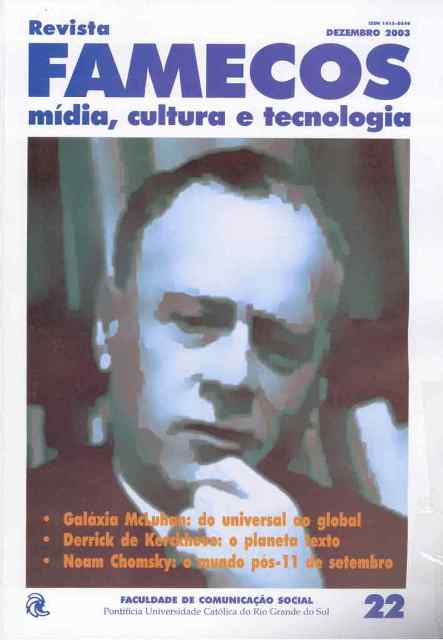The Blog culture: questions Introductory1
DOI:
https://doi.org/10.15448/1980-3729.2003.22.3236Keywords:
Culture and Communication, Technology and Society, WeblogsAbstract
To the most integrati, the Blog (or weblog) phenomenon has been considered a positive demonstration of culture evolution in Internet. Being on-line publication tools, Blogs have assumed the function of notifying individuals (and small collectives as well) about perceptions, places and specialized opinions on diverse subjects. One of the most popular subject matters is the private lives of their authors, the bloggers. However, far from being just a space for identity construction and representation, they strategically serve as a small media for colective productions. The signs related to blogs speak much more than just about the technical possibilities of this tool: the medium is not only the message but the context and producers as well.Downloads
References
BAUDRILLARD, Jean. O Sistema dos Objetos. São Paulo: Perspectiva, 1973.
BENAKOUCHE, Tamara. Tecnologia e Sociedade: contra a
noção de impacto tecnológico. Cadernos de Pesquisa, n.
, CFH/UFSC, Florianópolis, set/1999.
BLOOD, Rebecca. Weblogs: A History and Perspective.
Disponível em: http://www.rebeccablood.net/essays/weblog_
history.html Acesso em: 10 de fevereiro de 2003.
CASTELLS, Manuel. A Sociedade em Rede: A Era da informação - economia, sociedade e cultura. v. 1, 3. ed. São Paulo: Paz e Terra, 1999.
FEATHERSTONE, Mike. A Globalização da Complexidade: Pós-modernismo e cultura de consumo. RBCS, n. 32, ano
, out. 1996.
GIDDENS, Anthony. As Conseqüências da Modernidade. São
Paulo: Unesp, 1991.
JOLY, Martine. Introdução à Análise da Imagem. Campinas:
Papirus, 1996.
JONKATZ, Post. Here Comes the Weblogs. In: Slashdot.org.
Disponível em: www.directhop.com/cgi-bin/smartframe/
smartframe.cgi?http://slashdot.org/features/99/05/13/
shtml Acesso em: 15 jul. 2000.
PAZ, Carolina Rodrigues; BENAKOUCHE, Tamara.
“Co munidade EJA On-line: um ambiente Web para
integração de profissionais e pesquisadores da EJA. In: II TELECONGRESSO INTERNACIONAL DE EDUCAÇÃO
DE JOVENS E ADULTOS, 2002, Brasília. Anais... Brasília: UCB, 2002. Disponível em: http://www.idilica.com.br/projetos.html Acesso em: 7 de set. 2002.
______. Comunidade EJA On-line: Uma Proposta para
Integração dos Profissionais e Pesquisadores da Educação
de Jovens e Adultos (EJA) na Web. 2003. 100 f. Dissertação
(Mestrado em Engenharia de Produção) – Curso de Pós-Graduação em Engenharia de Produção, Universidade Federal de Santa Catarina, Florianópolis, 2003.
RHEINGOLD, Howard. The Virtual Community (The Electronic
Version). 1998. Disponível em: http://www.rheingold.com/vc/
book. Acesso em: 5 mar. 2002.
SANTAELLA, Lúcia. Cultura das Mídias. São Paulo: Razão
Social, 1992.
UNESCO. Small medias, new voices. The UNESCO Courier. Paris, n. 2, fevereiro, 2000. Disponível em: http://unesdoc.unesco.org/images/0011/001187/118789e.pdf
Acesso em: 5 mar. 2002.
WINKIN, Yves. A Nova Comunicação: Da Teoria ao Trabalho
de Campo. Campinas: Papirus, 1998.
Downloads
Published
How to Cite
Issue
Section
License
Copyright
The submission of originals to Revista Famecos implies the transfer by the authors of the right for publication. Authors retain copyright and grant the journal right of first publication. If the authors wish to include the same data into another publication, they must cite Revista Famecos as the site of original publication.
Creative Commons License
Except where otherwise specified, material published in this journal is licensed under a Creative Commons Attribution 4.0 International license, which allows unrestricted use, distribution and reproduction in any medium, provided the original publication is correctly cited.






